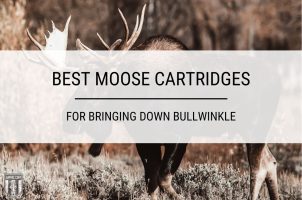Moose hunting season is upon us!
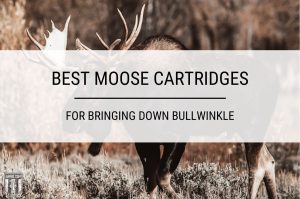
Finding the best moose cartridge is a lot like finding a wife. Beauty is often in the eye of the beholder.
Every moose hunter in North America is convinced that his or her rifle/cartridge combo is the best moose-killing machine in the woods.
Because there are so many strong opinions, finding the best moose cartridge to meet your hunting needs isn’t always an easy task.
In this article, we look at some of the most popular cartridges (plus a few less popular wild cards) available to modern moose hunters. As we dive into the advantages and disadvantages of each, it should help you narrow down the choices and find the cartridge that best suits your hunting needs.
Choosing the Best Cartridge for Moose Hunting
Because bull moose are the heaviest-bodied members of the Cervidae family, many inexperienced moose hunters believe they need a big bore cartridge. Although moose are definitely large, they aren’t particularly tough. In most situations, the rifle/cartridge combo you use for whitetail deer hunting will probably suffice.
However, if your moose hunting adventures take place in Alaska, where the moose are larger and also share a habitat with dangerous brown bears, you’ll probably want a cartridge with enough power to take on both.
Here are a few of our favorite options for bringing down big bull moose.
.30-06 Springfield
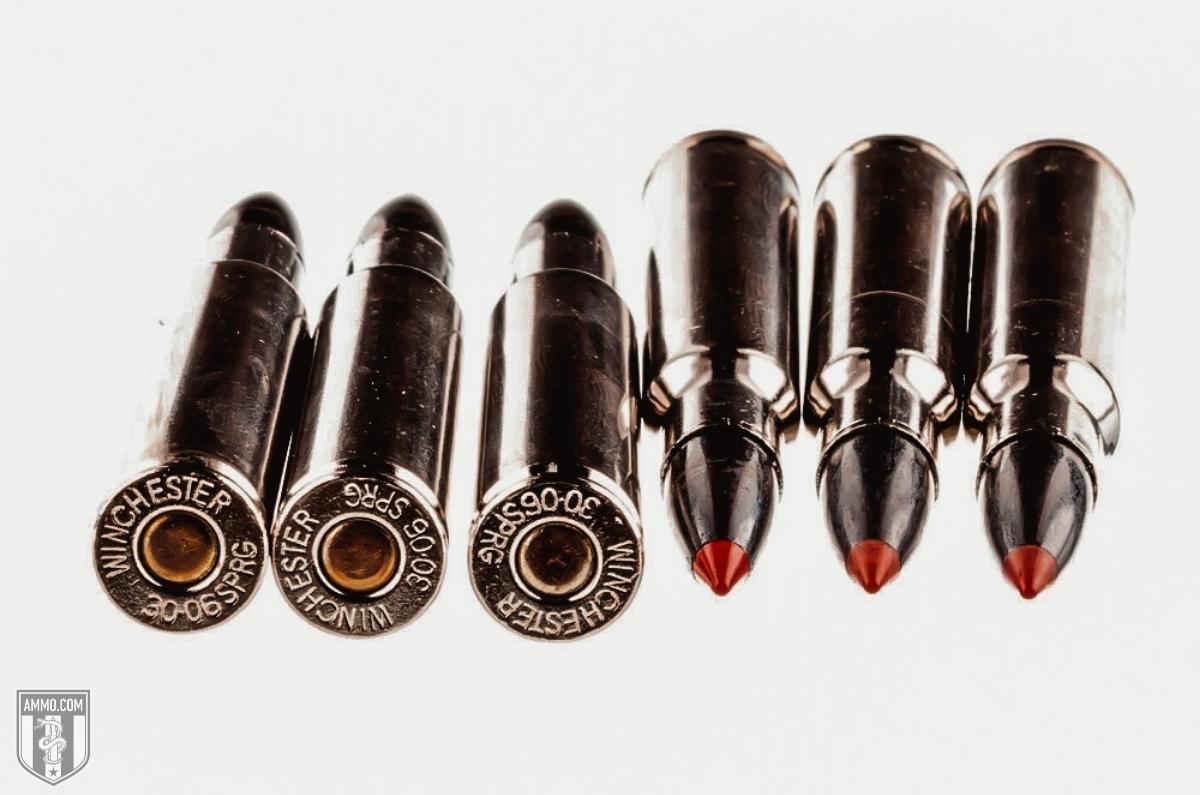
First introduced in 1906, the .30-06 Springfield has an impressive military pedigree. Not only has this cartridge won plenty of battlefield fame, but it is also responsible for putting tons of venison in family freezers.
The .30-06 is one of the most versatile hunting cartridges on Planet Earth. If you want one rifle capable of ethically harvesting every big game animal in North America, this is it. Not only has this cartridge killed more than its fair share of whitetails, but it is also been responsible for the demise of many a moose.
Today’s .30-06 loads leave the muzzle around 200 fps faster than the ammo our grandfathers were shooting. That extra speed gives the .30-06 a ballistic edge and a bit more terminal energy, which are both nice when hunting big-bodied bulls at distance.
One of the major perks to moose hunting with the .30-06 is that there is no shortage of either ammo or rifles to choose from. Every major gun and ammunition manufacturer will have plenty of loads and moose-worthy rifle models to choose from. Moose hunters should be able to find suitable bolt-action or semi-auto .30-06 rifles with no problem.
.308 Winchester
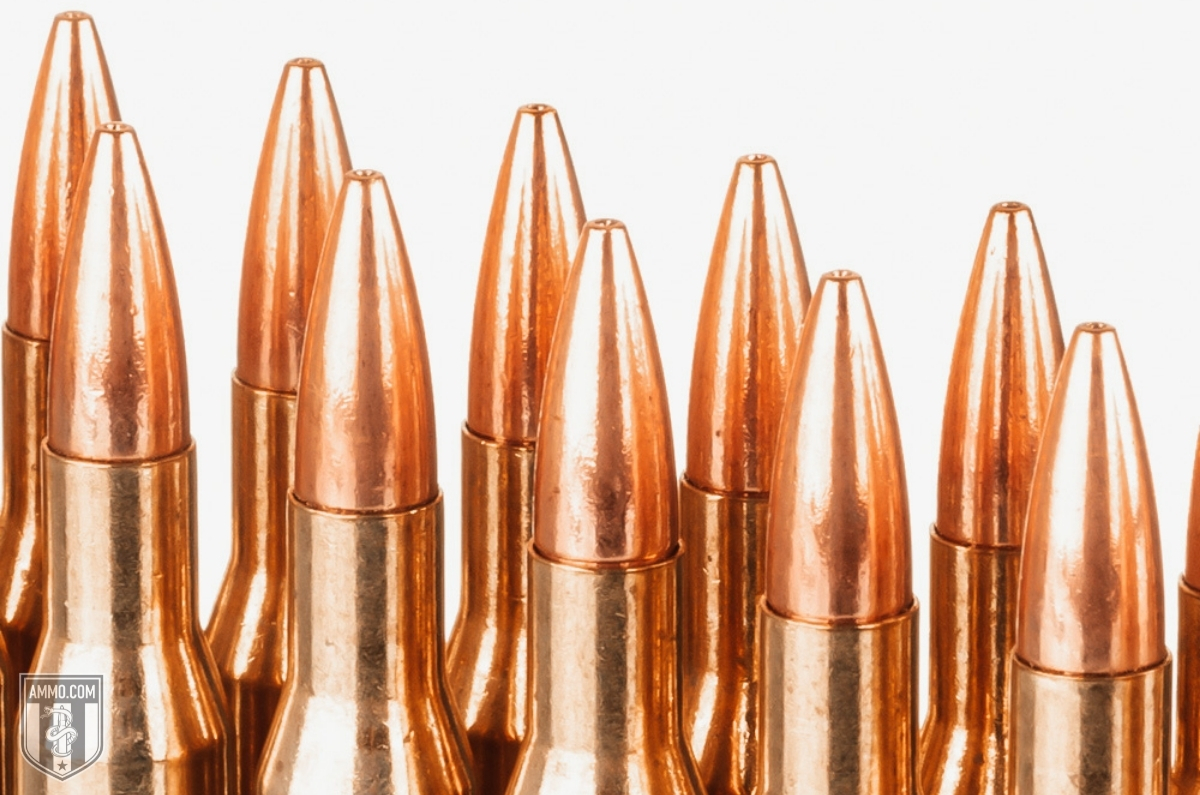
The .308 Winchester is another popular deer hunting cartridge that works well on moose. It doesn’t have quite the speed or terminal energy as the .30-06 Springfield, but modern powders and bullet designs have helped close the performance gap between these two popular cartridges.
One advantage the .308 Winchester has over the .30-06 is recoil. With significantly less felt recoil than the hard-hitting .30-06, hunters can make faster, more accurate follow-up shots with the .308 Win. That can be a major advantage when you are pursuing an injured moose through thick woods.
Rifles chambered in .308 have one other advantage for moose hunters. Because the .308 Win is a short action cartridge, the rifles chambered for it tend to be much lighter, more compact, and easier to tote through the backcountry.
.300 Winchester Magnum
Although the .30-06, .308 Win, and .300 Win Mag are all 30-caliber cartridges, the .300 Winchester Magnum delivers more power and better ballistics. Think of the .300 Winchester Magnum as a .30-caliber cartridge on steroids.
The .300 Win Mag has a storied military background and is widely used as a sniper round and for long-range marksmanship competitions. This is one flat-shooting cartridge.
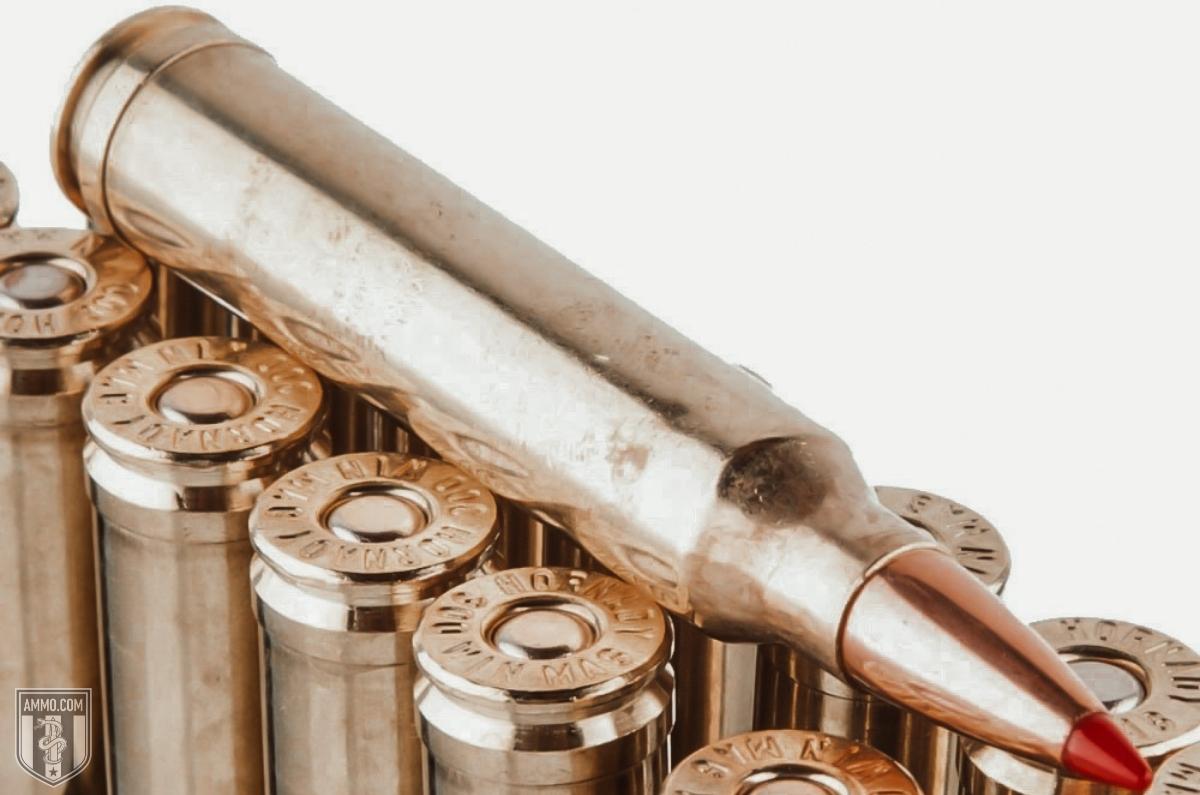
Not only does this cartridge shine ballistically, but its speed also pushes a 180-grain bullet from the muzzle with a whopping 3917 foot-pounds of energy.
If you really want to milk the power advantage of the .300 Win Mag, choose loads with even heavier bullets.
That terminal energy does come at a price. The .300 Win Mag delivers some hefty recoil. While most hunters should find the recoil manageable, it doesn’t exactly make for a fun day at the range. If you are recoil sensitive, this definitely isn’t the cartridge for you.
Rifles chambered for .300 Win Mag also tend to be heavy, long, and somewhat cumbersome. The ammo is notoriously tough on rifle barrels, too.
You shouldn’t have trouble finding plenty of .300 Win Mag ammo, but be prepared to spend a few extra cents per round. .300 Win Mag loads aren’t as cheap as most other .30-caliber rounds.
6.5mm Creedmoor
A relative newcomer to the big game hunting scene, the 6.5mm Creedmoor has earned a large and dedicated fan base.
The cartridge was first developed for long-range Precision Rifle Series competition. Topped with high sectional density bullets, the 6.5 Creedmoor is a ballistic superstar. These bullets leave the muzzle fast and hold onto that speed well downrange.
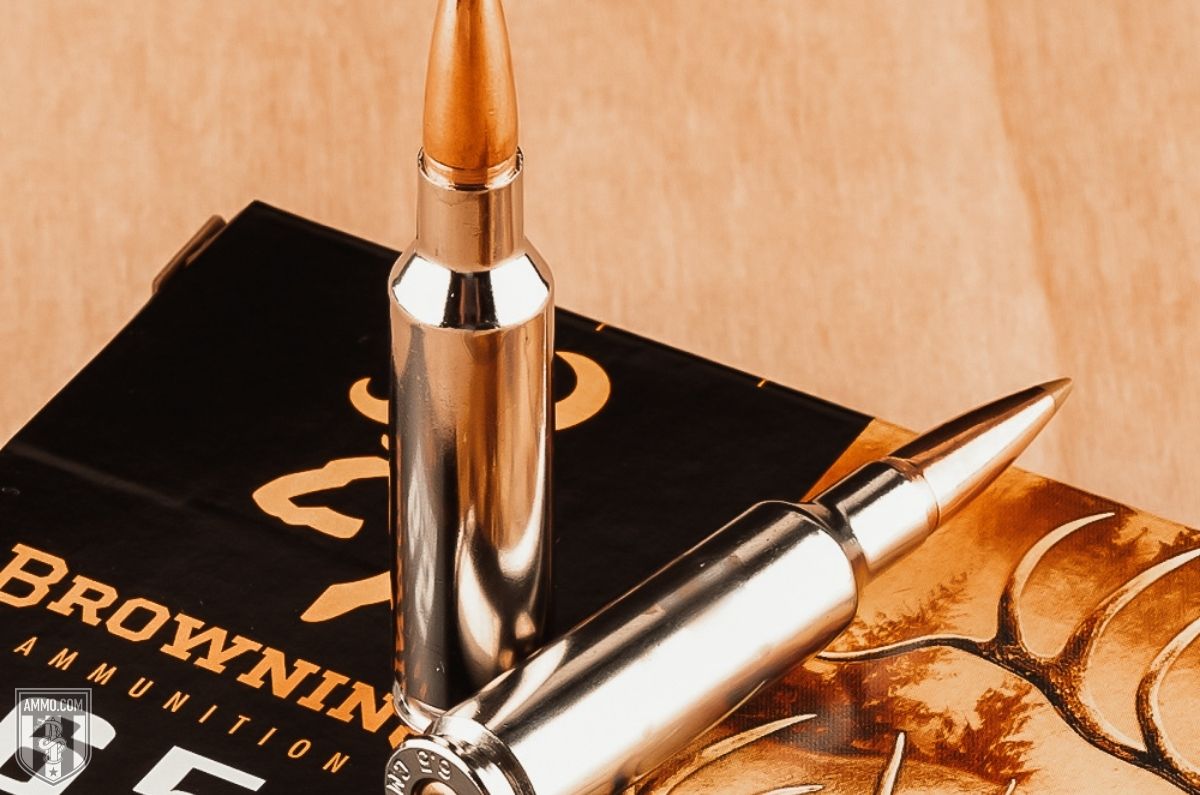
The high BC bullets also do a fine job of bucking the wind, making them one of the most inherently accurate loads available to modern big game hunters.
A good number of big game hunters consider the 6.5 Creedmoor to be a bit meager for large moose. However, Scandinavian moose regularly fall to the Creedmoor’s ballistic twin, the 6.5×55 Swede.
Still, you definitely don’t want to take a 6.5 Creedmoor moose rifle into bear country.
Pick big game loads that feature heavier bullets with a bonded construction, like the Nosler Partition or Accubond. This will help you achieve the penetration necessary to reach a moose’s deep-set vital organs.
Because the 6.5 Creedmoor is currently experiencing surging popularity, you can find plenty of ammo to feed your moose rifle.
Speaking of moose rifles, the 6.5 Creedmoor is widely available in most major models, which means you can choose everything from a traditional bolt-action to a modern AR-10.
6.5-300 Weatherby Magnum
If you want the high ballistic coefficient of a 6.5mm bullet but with a little more speed and power, the 6.5-300 Weatherby Magnum definitely delivers.
Although this cartridge hasn’t quite hit the mainstream just yet, it is still the fastest 6.5 factory cartridge in current production. The cartridge is based on a full-length .300 Weatherby Magnum case necked down to receive the smaller 6.5mm projectiles.
While off-the-shelf hunting loads are still hard to come by, handloading opens a whole new world of moose-stopping potential.
The 6.5-300 Weatherby Magnum beats the Creedmoor by a blistering 600 fps. That extra speed also increases energy, which means 140-grain bullets leave the muzzle of a 6.5-300 moose rifle carrying 3384 foot-pounds of knock-down power.
And because these are high BC 6.5mm bullets, they are still hauling 1764 foot-pounds of energy at 500 yards. If you want to hunt moose at extended ranges, this cartridge makes it possible.
Few moose hunters have the marksmanship skills to allow the 6.5-300 to reach its full potential. However, if you’ve got the goods, this cartridge has some serious long-range potential.
.270 Winchester
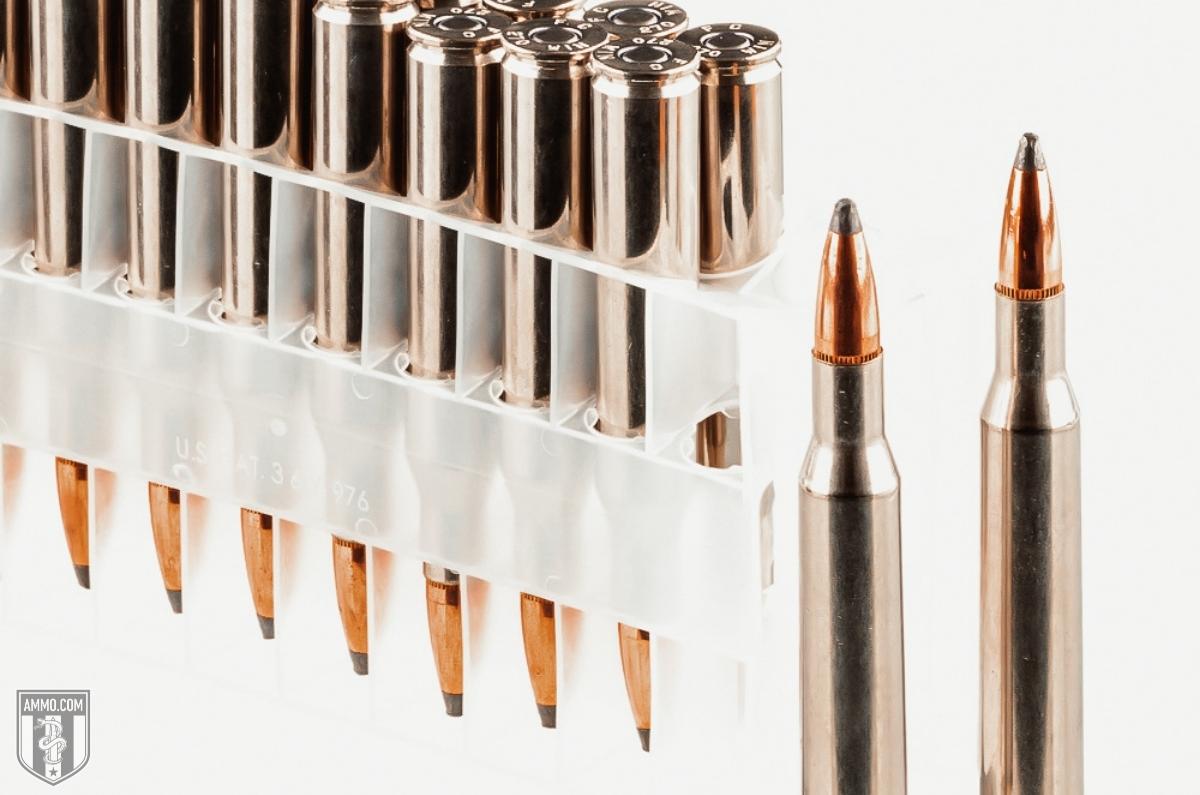
First introduced in 1925, the .270 Winchester has become one of the best-selling big game cartridges of all time. The cartridge was designed by necking down a .30-06 case to hold a smaller .270-inch bullet.
This cartridge delivers blistering muzzle velocities and shoots flat out past 300 yards. It also carries enough power to handle any North American game animal, including massive bull moose. If you want a do-it-all rifle that can easily transition from whitetails to antelope to caribou, you want one chambered in .270 Winchester.
As far as big game cartridges go, the .270 Win has pretty mild recoil. All but the most recoil-sensitive shooters should be able to handle it without batting an eyelash.
Most .270 rifles tip the scales at right around the 6 ½-pound mark, which makes them ideal for slogging through Canada’s vast backcountry.
7mm Remington Magnum
The 7mm Remington Magnum was the first commercially available magnum cartridge to hit the big game scene and it remains an American staple.
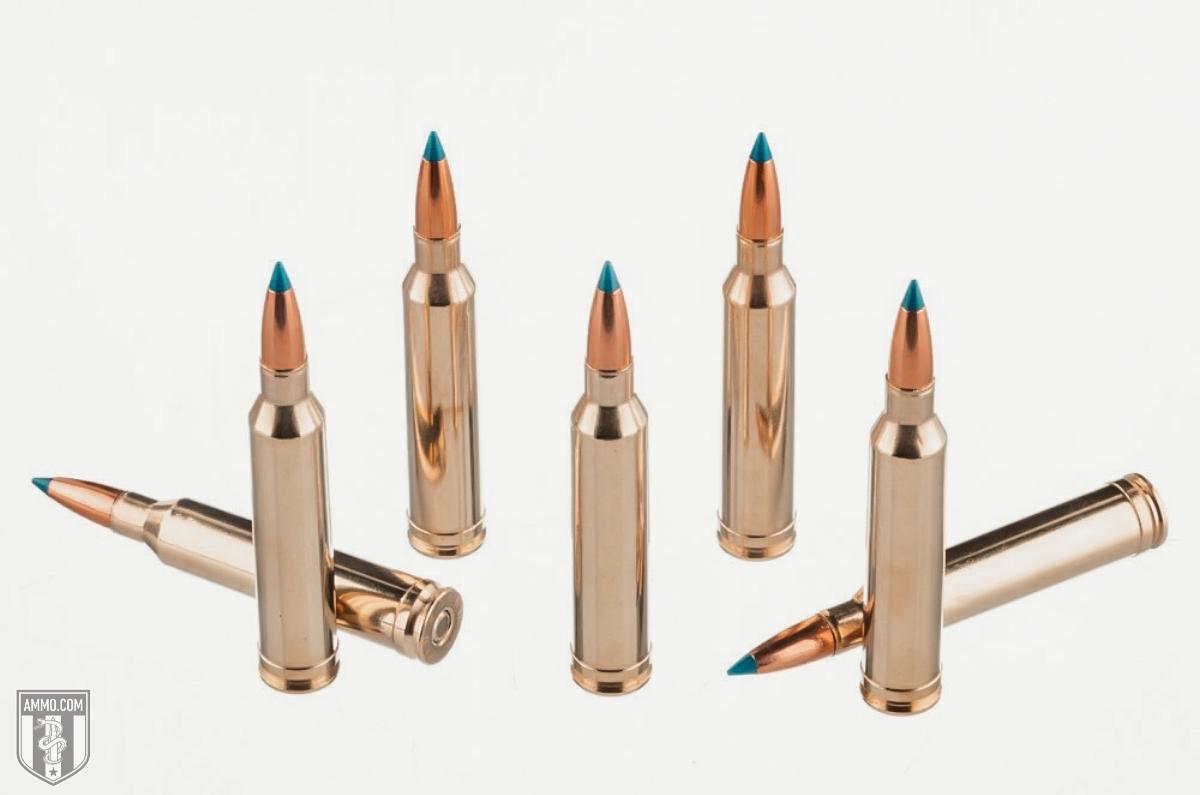
This cartridge has been around the block a time or two, which says something for the 7mm Rem Mag’s abilities. New cartridges are born and die almost every minute. For one to endure for as long as this one has, there has to be a reason. That reason is simple.
The 7mm Rem Mag freakin’ works.
The 7mm Rem Mag sits in a sweet spot between the big bullets of the .30-calibers and the high BC performance of the smaller (and insanely popular) 6.5mm Creedmoor. That means it nearly matches the ballistics and long-range capabilities of the 6.5mm Creedmoor but hits with energy closer to the .30-06 Springfield.
It also manages to provide all that incredible moose-dropping performance while producing fairly manageable recoil.
Thanks to the 7mm Rem Mag’s enduring popularity, both rifles and moose-worthy ammo aren’t at all difficult to find.
.338 Winchester Magnum
The rimless, bottlenecked .338 Winchester Magnum was first unveiled in 1958. It is basically a shortened, blown-out .357 H&H. cartridge.
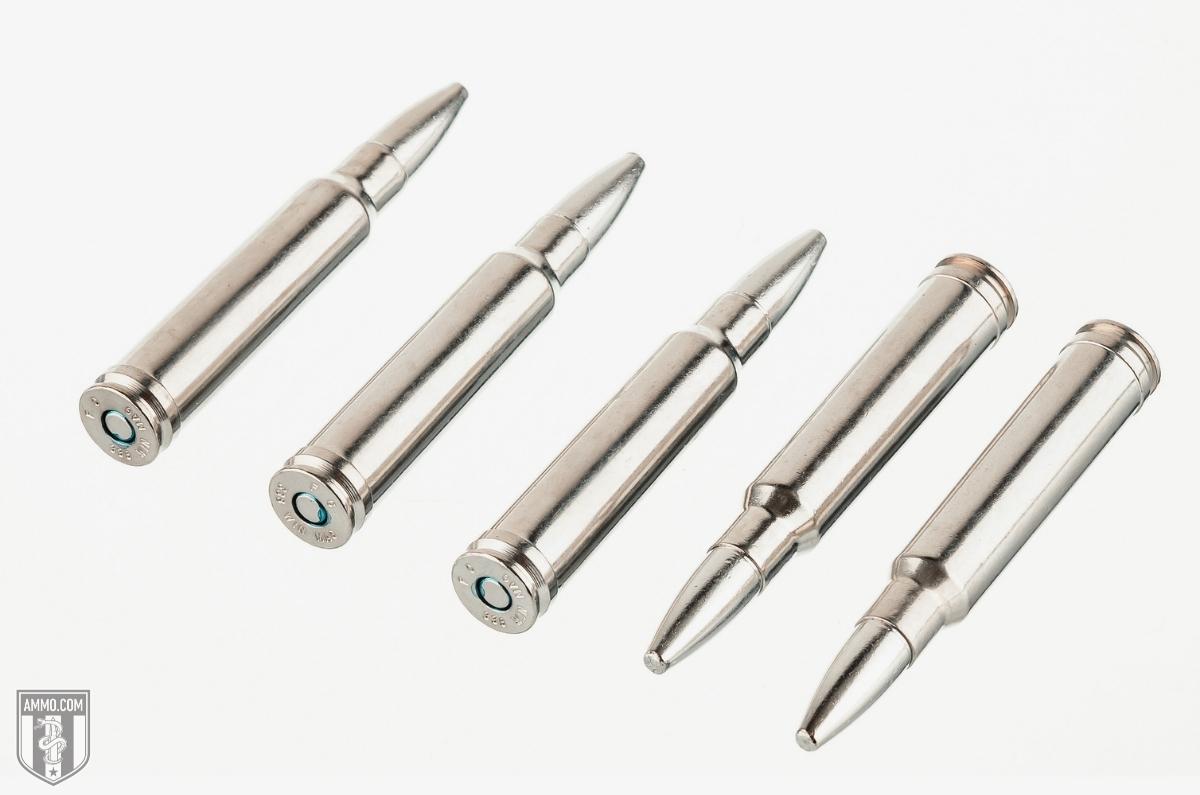
It packs a pretty powerful punch, and although it is a bit too much gun for whitetails, it works well for moose hunting, especially in areas where you might encounter dangerous games. This cartridge is actually a favorite for many Alaskan outfitters.
The .338 Win Mag shoots a hefty 225-grain bullet with 3817 foot-pounds of energy and a muzzle velocity of 2800 fps. If you’re hunting in brown bear country, go a little heavier and choose Nosler Trophy Grade loads with the heavier 250-grain bonded bullets.
The .338 Win Mag carries a ton of that energy downrange, making this a lethal option out to at least 400 yards with proper shot placement. However, this cartridge can be pretty abusive to your shoulder. If you aren’t a huge fan of recoil, you aren’t going to have a fun time shooting this one.
.375 H&H Magnum
Developed in 1912, by London gunmakers, Holland & Holland, the .357 H&H Magnum is one of the most reliable dangerous game cartridges in current production.
Although the .375 H&H Magnum is probably overpowered for hunting moose in the Lower 48, it is hugely popular with Alaskan moose hunters. It is also powerful enough to drop large African game animals like elephants and cape buffalo.
The .375 H&H can propel massive 300-grain projectiles from the muzzle of a sturdy rifle at 2530 fps. Right out of the gate, that bullet is carrying an impressive 4263 foot-pounds of hard-hitting energy. It’s still packing enough energy to drop a moose well beyond 300 yards.
However, the .375 H&H isn’t a long-range performer. Although it carries enough energy to fill your moose tag beyond the 300-yard mark, its trajectory drops off sharply beyond that point.
While the .375 H&H delivers some serious terminal energy, it also delivers some pretty harsh recoil. That 300-grain bullet fired from a sturdy 9-pound rifle is going to hit your shoulder with a cruel 37 foot-pounds of recoil energy. It takes some serious muscle to tame this recoil.
.375 Ruger
The .375 Ruger hit the market in 2007. It was originally designed as a joint effort between Hornady and Ruger. The duo’s main goal was to engineer a cartridge that would outperform the .375 H&H. The cartridge is slightly shorter than the H&H, so it fits in a standard-length action.
Whether it succeeds at outperforming the .375 H&H is largely a matter of opinion. The two cartridges produce fairly similar in-flight ballistics. The Ruger does have a slight power edge over the H&H, but it isn’t enough to kill a moose any deader.
The .375 Ruger’s case holds about 5% more powder, which produces slightly higher velocities. The faster velocity doesn’t necessarily improve its effectiveness for killing game. What it does, however, is allow hunters to have the same power as the H&H, but in a lighter, shorter-barreled rifle.
.45-70 Government
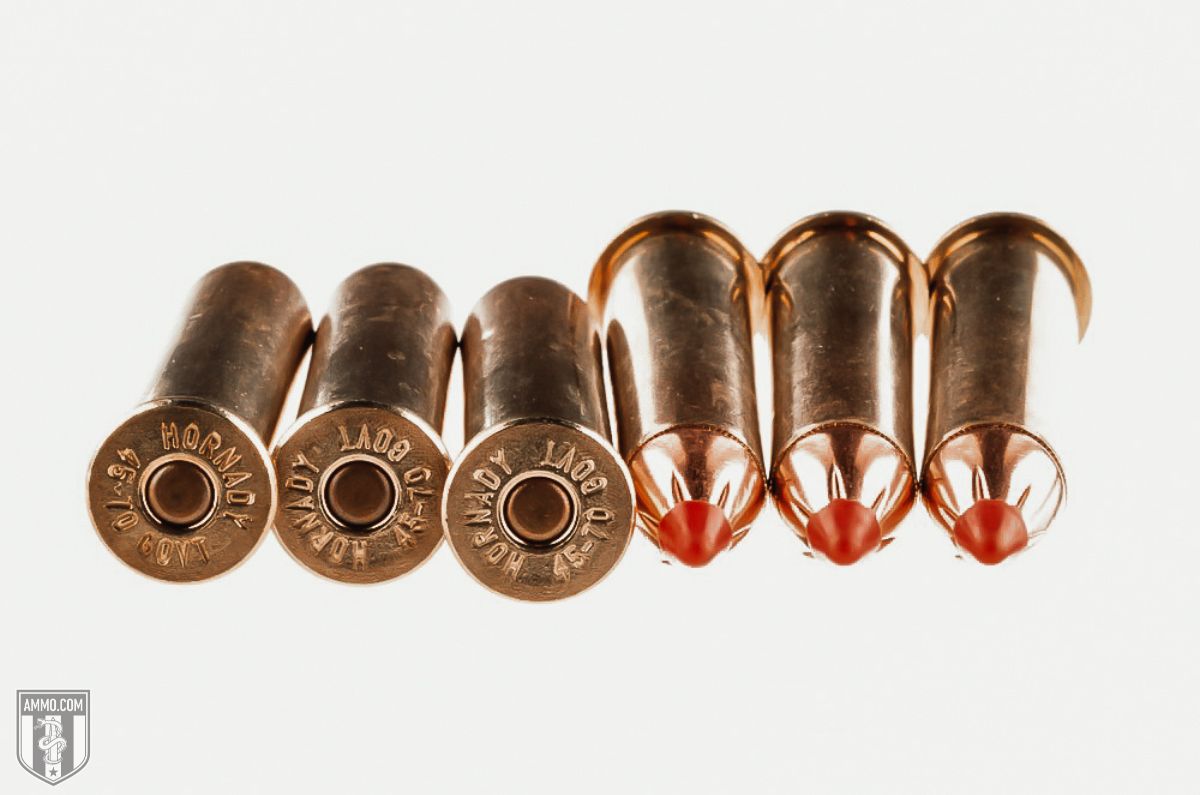
The .45-70 Government first hit the shooting scene way back in 1873. It began as a black powder cartridge for the breech-loading Springfield Model 1873, also known as the “Trapdoor Springfield.”
As one of the cartridges that helped tame the American West, the .45-70 was a popular chambering for cowboy-style lever action rifles. It still serves well in the moose woods in a lever action, which makes a sturdy brush gun for chasing bulls in the Lower 48.
Since the .45-70 is a straight-walled cartridge, they are legal to use in areas with straight-walled restrictions.
Despite its large caliber bullets, the .45-70 is fairly mild-mannered and surprisingly easy to shoot.
The .45-70’s ballistics aren’t exactly impressive, especially when compared to more modern cartridges. Muzzle velocity tends to be pokey, usually just over 2000 fps. However, the heavyweight projectiles hit with a wallop.
The bad news is that the .45-caliber projectiles shed both velocity and energy faster than a golden retriever on a black carpet. You’ll want to keep your shots inside of 150 yards.
Both Henry and Marlin are producing high-quality modern lever guns chambered in .45-70 Government.
If you’re toting a lever action with a tubular magazine, you’ll want to steer clear of loads featuring spire point bullets. As they line up end to end in the magazine, the point of one could potentially cause an accidental discharge with catastrophic consequences. Stick with simple soft points like Remington Core-Lokt.
If you want the advantage of a more aerodynamic bullet, try Hornady’s LEVERevolution. These loads are designed to function safely in tubular magazines.
Final Thoughts
As you can tell, there are a slew of moose-worthy cartridges on the market for big game hunters to choose from. Any of the options on this list is plenty capable of ethically harvesting big bull moose. Ultimately, the best moose cartridge is one you can use confidently and proficiently.
